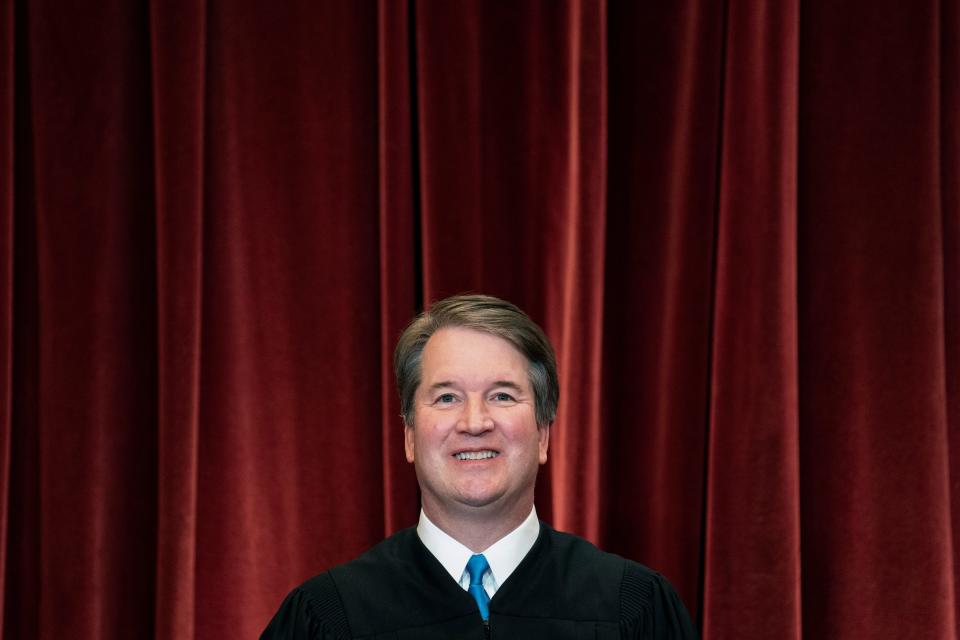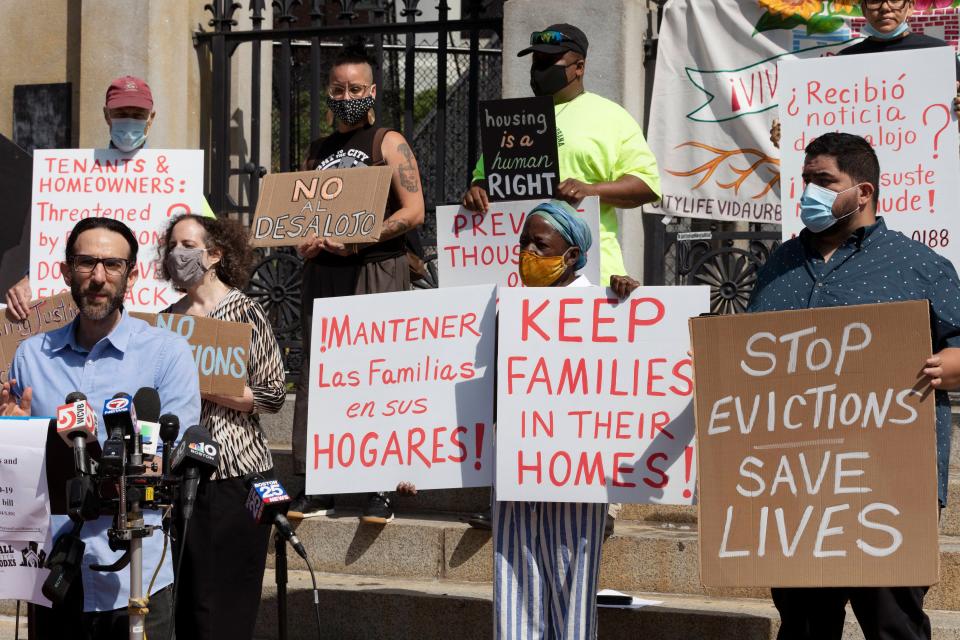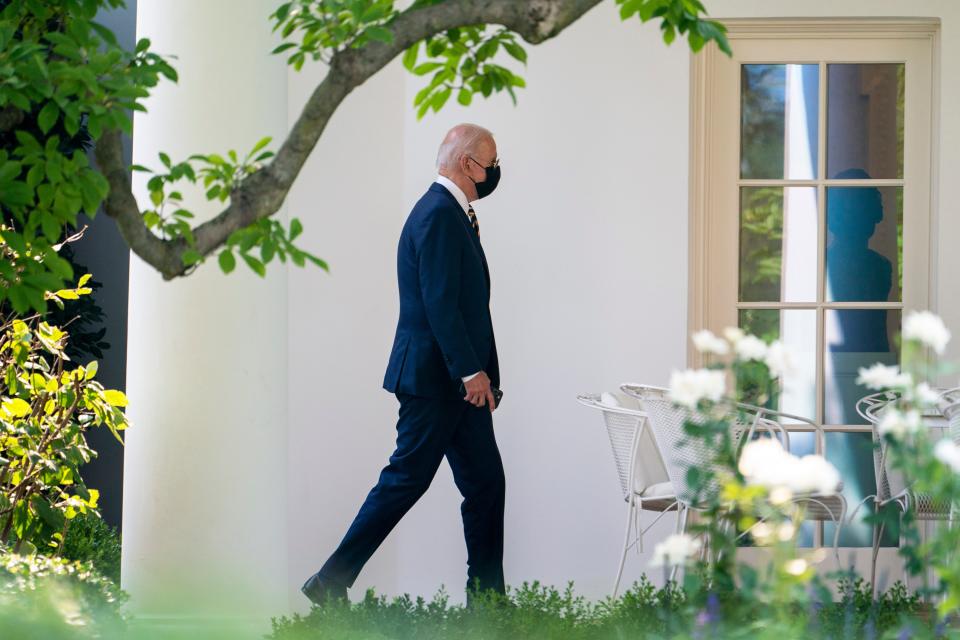Biden's COVID-19 eviction freeze is back at the Supreme Court. Here's how it got there.
WASHINGTON – President Joe Biden's eviction moratorium is in place for now, but Associate Justice Brett Kavanaugh will likely get the final word on how long it lasts.
Biden's effort to revive the moratorium during the COVID-19 pandemic is back before the Supreme Court, which is expected to decide in the coming days whether to block it. Kavanaugh, who had previously indicated he wouldn't support an extension, will be the key justice to watch in the dispute.
Millions of Americans are behind on rent and could face eviction if the high court stops the moratorium ordered by the Centers for Disease Control and Prevention. On the other hand, property owners say they've had to pay their own expenses for months while some tenants have stopped paying rent because of the freeze.
The real estate groups also assert the CDC exceeded its authority.
"Beyond the moratorium itself, the CDC's sweeping view of its own domain would, if left unchecked, allow it to adopt future regulations governing nearly all aspects of national life in the name of public health," the groups told the Supreme Court.
New freeze: Biden issues moratorium on evictions for areas hit hardest by COVID-19
Prior appeal: Supreme Court asked to block CDC's eviction moratorium
Earlier decision: Supreme Court permits federal eviction moratorium to remain in place
The Biden administration countered that the delta variant makes it even more important to keep an eviction moratorium in place through early October – at least.
"The trajectory of the pandemic has since changed – unexpectedly, dramatically, and for the worse," the Justice Department told the high court. "The CDC has the statutory authority to halt evictions to prevent the spread of communicable disease."
Here's a look at the dispute and how the case wound up back at the Supreme Court:
Started under Trump
Congress approved the original eviction moratorium in the early months of the pandemic. When it expired in July 2020, President Donald Trump ordered the CDC to impose its own freeze, which it did in September.
Biden extended that order through last month, prompting a lengthy political and legal battle.

A group of real estate entities in Alabama and Georgia sued in a case that went to the Supreme Court in June. The CDC relied on the Public Health Service Act to impose the moratorium, a 1944 law that gives the agency power to impose quarantines and other measures to combat diseases. But the groups told the high court that "Congress never gave the CDC the staggering amount of power it now claims."
The statute authorizes the secretary of Health and Human Services to make and "enforce such regulations as in his judgment are necessary to prevent the introduction, transmission, or spread of communicable diseases." While the law doesn't explicitly include eviction moratoria, the CDC has said that when people are forced from their homes they could wind up staying with relatives or friends in cramped quarters, making it harder to control transmission of the coronavirus.
More than 3.5 million people said they are likely to face eviction in the next two months, according to the U.S. Census Bureau, though it's not clear how many of them qualify for relief under the federal moratorium. The real estate groups assert that landlords are losing as much as $19 billion a month from unpaid rent.
"It all comes down to whether the statute authorizes this," said Anthony Sanders, director of the libertarian Institute for Justice's Center for Judicial Engagement.
What the Supreme Court has said
A 5-4 majority of the Supreme Court in June upheld a ruling from the U.S. Court of Appeals for the District of Columbia Circuit that allowed the freeze to remain in place temporarily. In other words, the high court sided with the government and against the real estate groups.
The majority of the court did so without explanation.

But one of the justices, Kavanaugh, wrote that he voted to keep the ban in place only because it was about to expire anyway. The CDC, he asserted, "exceeded its existing statutory authority" and any extension, he wrote, would require "clear and specific congressional authorization." His one-paragraph concurring opinion was widely viewed as a sign that he would not support another unilateral extension by Biden.
Four others – one shy of a majority – said they would have sided with the real estate groups in temporarily halting the moratorium. Those four were Associate Justices Clarence Thomas, Samuel Alito, Neil Gorsuch and Amy Coney Barrett.
If Kavanaugh switches sides this time and those four justices hold, there would be a majority to block the moratorium. At issue is whether to block the freeze while lower courts hash out the underlying questions about the CDC's authority.
How Biden responded
Citing the June Supreme Court decision, the White House initially asked Congress to approve a new moratorium. That didn't happen and the initial freeze expired.
Under mounting pressure from congressional Democrats – including a protest led by Rep. Cori Bush, D-Mo., who camped out on the Capitol steps to draw attention to the issue – Biden announced on Aug. 3 what officials called a "targeted," 60-day freeze on evictions in counties with substantial or high transmission of COVID-19. About 95% of the nation's counties meet that threshold, according to CDC data.

Housing advocacy groups applauded the CDC's action at the time.
"This is a tremendous relief for millions of people who were on the cusp of losing their homes and, with them, their ability to stay safe during the pandemic," said National Low Income Housing Coalition president Diane Yentel.
But Biden acknowledged the uphill legal fight he was picking, noting "the bulk of the constitutional scholarship says that it’s not likely to pass constitutional muster." The president said the new order would "probably give some additional time" for renters and for federal assistance to flow to those who needed it.
Administration officials were careful to frame the CDC action as a new moratorium, not an extension of the earlier one. In a notice to the U.S. District Court for the District of Columbia, the Justice Department said the CDC determined the new order "was necessary especially in light of recent spread caused by the Delta variant."
Two victories for Biden administration
Two lower federal courts have allowed the freeze to stand.
U.S. District Judge Dabney Friedrich, a Trump nominee, ruled in favor of the Biden administration on Aug. 13, citing an appeals court's decision to keep the earlier version of the moratorium in place. In her ruling, Friedrich said the new moratorium is an extension of the earlier policy, but said the appeals court's earlier decision prevented her from blocking the latest eviction freeze.
On Friday, that appeals court, the D.C. Circuit, upheld Friedrich's decision in a one-paragraph order. The real estate groups filed an emergency motion at the Supreme Court hours later, bringing the dispute back to the nation's highest court for the second time this summer.
Contributing: Kristine Phillips
This article originally appeared on USA TODAY: CDC's new COVID-19 eviction moratorium to be ruled on by Supreme Court

 money
money 